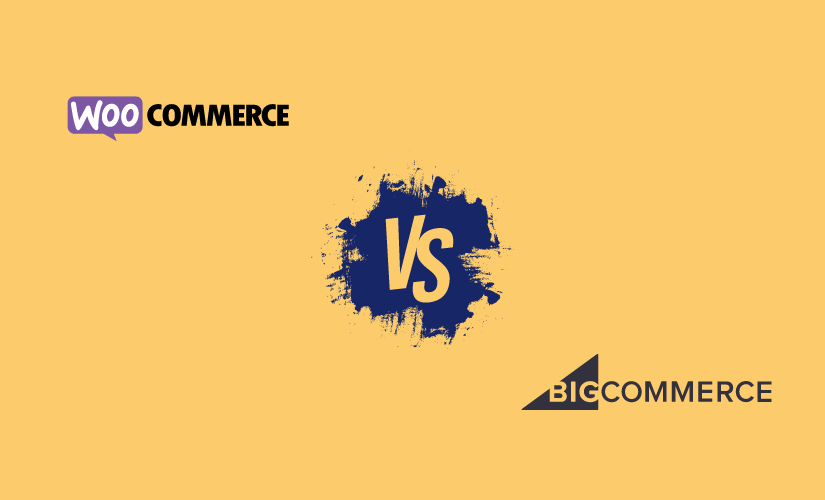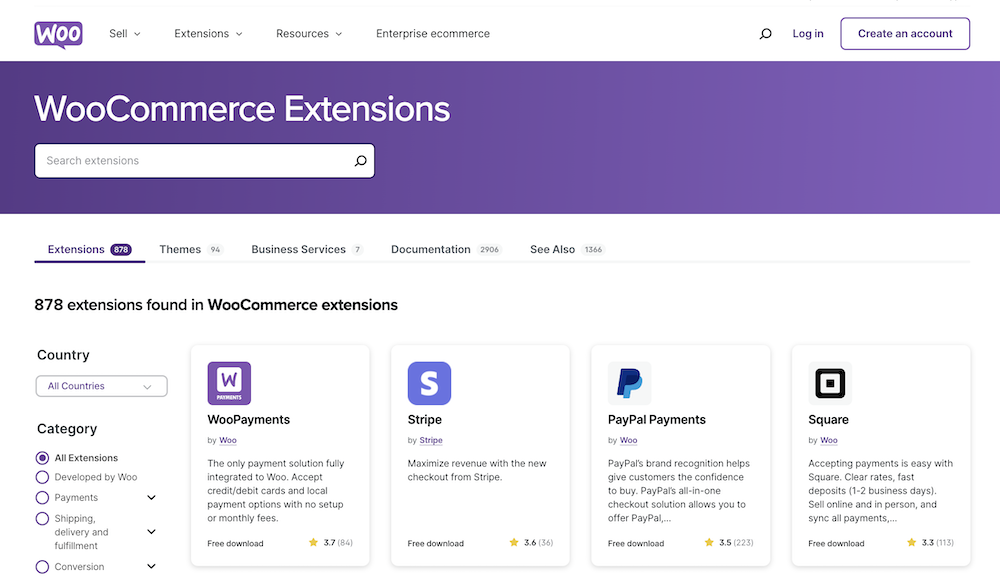Looking to build an eCommerce store but unsure which platform to choose? Explore our WooCommerce vs BigCommerce comparison to find out which one is perfect for your store.
Choosing the right platform is crucial when building an online store. WooCommerce and BigCommerce are two of the most popular options, each offering unique advantages. While both platforms are robust, they cater to different needs in terms of features, scalability, and costs. If you’re unsure which one is the best fit for your store, you’re in the right place.
In this WooCommerce vs BigCommerce comparison, we’ll break down the key features, pricing, customization options, ease of use, and scalability to help you make an informed decision for your eCommerce business.
WooCommerce vs BigCommerce: A Comprehensive Comparison
Both platforms offer a robust set of features, but they have some key differences. Before we dive in, let’s take a closer look at each.
WooCommerce Overview
WooCommerce is a free, open-source eCommerce platform designed for everyone to build a store. It offers total control over the design and functionality of your online store, making it highly customizable with thousands of plugins and extensions.

WooCommerce allows for full data ownership and offers a wide range of themes, making it an ideal solution for businesses that prefer flexibility and control. Users have the advantage of managing their own web hosting, security, and ongoing maintenance, giving them full control and flexibility over how their site operates and evolves
Key Features of WooCommerce
WooCommerce offers a rich array of features and customization options. Let’s dive into some of its most notable features
- Open-Source and Free: WooCommerce is a free, open-source WordPress plugin, offering full control over your online store without licensing fees.
- Full Customization: With thousands of themes and plugins, WooCommerce allows for complete customization of your store’s design and functionality.
- Product Management: Easily manage unlimited products, including variations, categories, and inventory, with user-friendly product management tools.
- Secure Payment Gateways: WooCommerce supports various payment gateways like PayPal, Stripe, and others, offering flexibility in payment options.
- Extensive Plugin Library: WooCommerce has access to a vast range of plugins to enhance functionality, from SEO and marketing to analytics and customer service.
- SEO-Friendly: With WordPress’s SEO strengths, WooCommerce allows easy optimization of product pages, helping improve search engine rankings.
- Analytics and Reporting: Built-in analytics tools provide insights into sales, customer data, and product performance, with Google Analytics integration for advanced tracking.
- Strong Community Support: WooCommerce has a large community with extensive documentation, forums, and resources for support.
- Advanced Marketing Tools: Built-in features like abandoned cart recovery, discount codes, and email marketing integrations help boost sales.
- Extensions and Plugins: WooCommerce has an ecosystem of over 50,000 plugins for extending functionality in areas like marketing, inventory, and analytics.
BigCommerce Overview
BigCommerce is a fully hosted, SaaS eCommerce platform that caters to businesses of all sizes, offering a comprehensive package with all the essential features needed to run an online store. It eliminates the need for technical maintenance, as hosting, security, and updates are managed by BigCommerce.

This is a good choice for store owners who prioritize ease of use and want a hands-off experience when it comes to technical management.
Key Features of BigCommerce
BigCommerce comes packed with powerful features and capabilities. Let’s explore some of its standout features.
- All-in-One Platform: BigCommerce is a fully hosted solution, that handles hosting, security, and maintenance, so you can focus on running your store without technical worries.
- No Transaction Fees: BigCommerce doesn’t charge transaction fees, even when using third-party payment gateways, saving you money as you grow.
- Robust Scalability: The platform automatically scales with your business, providing enterprise-level infrastructure to handle increased traffic and sales.
- Built-in SEO Tools: BigCommerce includes customizable URLs, meta tags, and automatic sitemaps to help optimize your store for search engine visibility.
- Multi-Channel Selling: Sell on platforms like Amazon, eBay, Facebook, and Instagram directly from your BigCommerce dashboard.
- Payment Gateway Options: BigCommerce supports over 65 payment gateways, including PayPal, Stripe, and Apple Pay, giving you flexibility in payment processing.
- Shipping and Fulfillment: The platform offers real-time shipping integrations with major carriers like UPS, FedEx, and USPS, as well as flexible shipping rules.
- Secure and PCI-Compliant: BigCommerce ensures that your store is PCI-compliant and provides advanced security features, including HTTPS and DDOS protection.
WooCommerce vs BigCommerce: A Comprehensive Comparison

In our WooCommerce vs BigCommerce comparison, we will judge WooCommerce and BigCommerce based on key metrics, including ease of use, scalability, apps and integrations, performance, and cost, to help you determine which platform is best suited for your business needs.
Ease of Use: WooCommerce vs BigCommerce
- WooCommerce: Built on WordPress, WooCommerce is a fantastic choice for users familiar with the WordPress ecosystem. For those who value control and customization, WooCommerce offers an unmatched level of flexibility. While it requires managing your hosting, SSL certificates, updates, and security, this also means you have full autonomy to optimize and personalize every aspect of your store. With a vast library of plugins and themes, you can tailor the platform to your specific business needs.
- BigCommerce: BigCommerce is designed to be user-friendly and requires no technical expertise. Everything is managed for you, from hosting to security, making it a good choice for business owners who prefer a hands-off approach. The streamlined setup lets users launch their store quickly without worrying about technical maintenance or configuration. However, this simplicity can also limit your ability to customize the platform to the same degree as WooCommerce.
Verdict: WooCommerce is perfect for users who want control and customization, especially if you’re comfortable with WordPress. While the setup might involve more steps, the result is a highly tailored store that fits your unique requirements. BigCommerce, on the other hand, offers a simpler, hands-off experience, ideal for those who prefer not to deal with technical aspects.
Customization and Flexibility: WooCommerce vs BigCommerce
- WooCommerce: One of the major strengths of WooCommerce is its unparalleled customization. As an open-source platform, it allows you to modify the code to suit your specific needs. WooCommerce is supported by thousands of plugins and extensions that add virtually any feature you could imagine—from advanced shipping options to specialized payment gateways. Additionally, WooCommerce’s integration with WordPress offers access to thousands of themes and design options.
- BigCommerce: While BigCommerce also offers a range of customization options, it doesn’t provide the same level of flexibility as WooCommerce. Customizations on BigCommerce are generally limited to what’s available within the platform and its app marketplace. For advanced customizations, you may need to rely on developers, though BigCommerce does offer a robust API for more technical users. The theme selection, while good, is not as extensive as what’s available with WooCommerce.
Verdict: If you need ultimate flexibility and customization, WooCommerce is the better option. BigCommerce is great if you need basic customizations but don’t want to dive deep into coding or complex plugins.
Performance: WooCommerce vs BigCommerce
- WooCommerce: WooCommerce’s performance is highly customizable, giving you the freedom to choose your hosting environment and optimize your store’s performance to suit your needs. For small to medium-sized businesses, with the right hosting and optimizations like caching and CDNs, WooCommerce can handle significant traffic and provide a fast, reliable experience. The flexibility to scale performance as your business grows puts you in control of your store’s infrastructure, allowing for tailored solutions to meet growing demands.
- BigCommerce: BigCommerce, as a fully hosted platform, ensures high performance and scalability right out of the box. Its robust infrastructure is designed to handle increasing traffic and order volumes without user intervention. With built-in performance features, including fast content delivery, it’s a good choice for businesses looking to grow without worrying about backend management.
Verdict: Both WooCommerce and BigCommerce excel in performance when set up correctly. WooCommerce offers greater control and flexibility, allowing for custom performance optimizations, while BigCommerce provides a hassle-free, scalable solution with built-in performance features. Depending on your needs, either platform can effectively support your business’s growth.
Integrations and Apps: WooCommerce vs BigCommerce:
- WooCommerce: WooCommerce shines with its vast ecosystem of integrations and plugins, giving users access to over 50,000 plugins that extend functionality in nearly every area, from marketing to inventory management. Since WooCommerce is built on WordPress, it integrates seamlessly with thousands of other WordPress plugins, making it highly adaptable for businesses of all sizes. The open-source nature allows you to add any third-party apps or even custom-developed features, offering virtually unlimited possibilities for expanding your store’s capabilities.

- BigCommerce: BigCommerce offers a wide range of built-in apps and integrations, with hundreds of apps available through its marketplace to help enhance store functionality. While it doesn’t have the sheer volume of plugins WooCommerce offers, BigCommerce still provides essential integrations with major platforms like Amazon, eBay, and social media channels, making it easy to scale and manage various aspects of your store. BigCommerce’s native integrations streamline operations, giving users a more straightforward, plug-and-play experience.
Verdict: WooCommerce stands out for its unmatched flexibility and sheer number of integrations, making it ideal for those who want to customize their store extensively. BigCommerce, while offering fewer options, provides all the key integrations in a more simplified and user-friendly way, ideal for those seeking a hassle-free approach.
Cost Comparison: WooCommerce vs BigCommerce
- WooCommerce: WooCommerce itself is free to install, but that doesn’t mean it’s without cost. The total cost of running a WooCommerce store includes hosting, domain registration, SSL certificates, themes, and plugins. While some of these can be found for free, premium themes, hosting services, and essential plugins (for payment gateways, marketing, or SEO) can add up. However, this flexible pricing structure allows businesses to choose only the services they need, and WooCommerce can be relatively affordable, particularly for smaller stores.
- BigCommerce: BigCommerce offers a subscription-based pricing model. While it’s more expensive upfront, this pricing includes hosting, security, and a range of built-in features like payment gateways, shipping, and marketing tools. BigCommerce’s higher-tier plans are generally suited for businesses with larger sales volumes, as pricing also increases based on revenue.
Verdict: WooCommerce offers more flexibility in terms of cost, particularly for smaller stores, but you’ll need to manage expenses for hosting and add-ons. BigCommerce has a higher upfront cost but includes hosting, security, and other essential features.
SEO and Marketing Tools: WooCommerce vs BigCommerce
- WooCommerce: Since WooCommerce is built on WordPress, which is known for its SEO-friendly structure, it provides powerful tools for optimizing your site’s visibility. You have access to a variety of SEO plugins, such as Yoast SEO and Rank Math, that make it easy to optimize product pages, meta tags, and sitemaps. WooCommerce also integrates with email marketing platforms, social media, and other promotional tools to help boost sales.
- BigCommerce: BigCommerce offers excellent SEO features out of the box, including customizable URLs, automatic sitemaps, and mobile optimization. It also provides built-in tools for abandoned cart recovery, email marketing, and customer segmentation. BigCommerce integrates with popular advertising platforms like Google Ads, Facebook, and Instagram to help drive traffic and sales.
Verdict: Both platforms provide strong SEO and marketing tools, but WooCommerce has the edge when it comes to deep SEO customization, thanks to its WordPress foundation. BigCommerce offers more built-in marketing tools without requiring additional plugins.
Scalability: WooCommerce vs BigCommerce
- WooCommerce: Scalability with WooCommerce can be a powerful advantage when approached strategically. While WooCommerce is self-hosted, meaning you are responsible for scaling your website, this also provides flexibility and control. As your business grows, you have the freedom to upgrade your hosting plan, implement performance enhancements like caching and CDNs, and customize your infrastructure to meet your unique needs. The advantage here is that you’re not limited by predefined hosting constraints—you can tailor your resources based on the specific requirements of your store. Additionally, WooCommerce’s open-source nature allows you to integrate advanced tools and plugins that can scale with your store, helping you handle larger product catalogs, more traffic, and complex workflows.
- BigCommerce: BigCommerce, being a fully hosted platform, is built with seamless scalability in mind. As your store grows, BigCommerce automatically adjusts to manage increased traffic, higher order volumes, and additional product listings without any action required on your part. This hands-off approach ensures you won’t need to worry about technical configurations as your business expands. BigCommerce’s infrastructure, optimized for high performance, includes features like CDN and automatic scaling to ensure your site remains fast and secure even during traffic spikes.
Verdict: WooCommerce allows for a highly customizable and flexible scalability path, giving you control over how and when to scale, which can be beneficial for businesses looking for tailored solutions. BigCommerce offers a more automated, hands-free approach to scaling, ideal for businesses wanting a straightforward, managed solution.
Support and Maintenance: WooCommerce vs BigCommerce
- WooCommerce: With WooCommerce, being self-hosted offers the advantage of full control over your website. While support is community-driven, the vast WordPress ecosystem provides extensive resources, including forums, tutorials, and third-party support services. You also have the flexibility to choose the best hosting provider for your needs, with many offering technical assistance for server-related issues. For more tailored support, you can hire skilled developers or agencies, giving you access to a high level of expertise to meet your specific needs.
- BigCommerce: BigCommerce provides 24/7 customer support through multiple channels, including live chat, email, and phone. Because the platform handles hosting, security, and maintenance, users can rely on BigCommerce for help with most technical and operational issues. This level of support makes it easier for non-technical users to manage their stores.
Verdict: BigCommerce offers good customer support, making it ideal for users who want hands-on assistance. WooCommerce empowers users with greater flexibility and access to a wealth of community and professional resources for more customized solutions.
WooCommerce vs BigCommerce: Comparison in a Table
The table below highlights key aspects of WooCommerce and BigCommerce, providing a clear overview of their strengths and weaknesses.
| Features | WooCommerce | BigCommerce |
|---|---|---|
| Platform Type | Open-source, self-hosted | Fully hosted, SaaS |
| Ease of Use | Requires technical knowledge for setup | User-friendly, no technical knowledge |
| Customization | Highly customizable | Moderate customization options |
| Themes & Design | Thousands of WordPress themes | Dozens of free and premium themes |
| Hosting | Requires third-party hosting | Hosting included in plans |
| Cost | Free core, but with extra costs | Subscription-based, no hidden fees |
| Payment Gateways | 100+ gateways with no platform fees | 65+ gateways with some transaction fees |
| Apps & Plugins | Over 50,000 plugins | Hundreds of built-in apps |
| Scalability | Requires hosting upgrades | Built-in scalability |
| SEO Capabilities | Advanced SEO features | Strong built-in SEO |
| Security | User-managed | Security included in all plans |
WooCommerce VS BigCommerce: Which Platform Should You Choose?
Choosing between WooCommerce and BigCommerce depends on your priorities. If you seek control, and flexibility, and are comfortable managing technical aspects, WooCommerce offers greater customization and scalability. On the other hand, if you prefer an all-in-one solution with less technical management, BigCommerce is a better choice, offering simplicity and ease of use with built-in tools.
Both WooCommerce and BigCommerce are top-tier eCommerce platforms with unique strengths. WooCommerce offers extensive customization and control, making it ideal for store owners looking for flexibility, while BigCommerce is a fully managed, all-in-one solution for those who prefer simplicity.
Ultimately, WooCommerce is a strong choice for businesses that value customization and control, while BigCommerce offers a user-friendly experience with built-in solutions. Consider your specific needs to determine which platform best suits your e-commerce journey!



